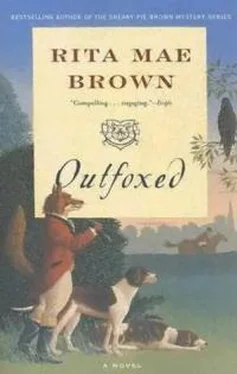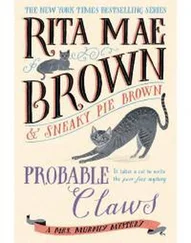He interrupted. “And beautiful. Truly, Sister.”
“You do have a way with women.” She lowered her eyes, then raised them, a gesture that had drawn men to her since she was a child. “I can no longer put off preparing for the future of the hunt without me. I hope I can hunt as long as Ginny Moss of Moore County Hounds, still whipping-in at ninety, but nonetheless, I must do something I have never wanted to do: I must take a joint-master.” Fontaine held his breath as she continued. “You are one of us. You are known throughout the state by other masters. You’ve hunted with other hunts in other states. You’ve participated in many Masters of Foxhounds Association functions. You’ve chaired committees on public land use. You’ve made connections in Richmond and in Baltimore, too. You’re politically astute, as was your mother, god rest her soul. You have a good sense of what it takes to keep a hunt going although believe me, you never know until you’re master. But Fontaine, you also have drawbacks. You are a philanderer of the first order.” She again held up her hand. “I’m not judging. You know what Raymond used to say, ‘Men have balls. They have to use them.’ That’s when I brought out the frying pan. At any rate, that caused problems. Messy problems. And you have little money to throw into the pot. Am I right?”
He gulped. “Yes, ma’am.”
“Now I must ask you something directly. I am sorry to do this but circumstances compel me. Have you had or are you having an affair with Marty Howard?”
Relieved, he said, “No.”
Her black eyebrows rose. “Why?”
He laughed. “Chemistry. And no matter what you may think of me, Sister, it wouldn’t have been sporting. She was devastated during the separation and divorce.”
“I believe you. Thousands wouldn’t.” She laughed with him.
“I deserve that.”
“Sorrel”—she named Fontaine’s wife—“is an unusually tolerant woman.”
“Oh, Sister, we married too young. She’s my best friend. We have an arrangement. Rather European. I would not end my marriage for anything in the world. I value her and I love her. Can you—?”
He didn’t finish because she knew the next word was “understand.” She finished her coffee, then simply stated, “Of course I understand. It’s eminently civilized. And you have two small children to consider. As long as you and Sorrel”—she accented the “el,” which was the proper way to pronounce the name—“can bring stability and comfort to one another, I applaud you. I am only telling you it is something one must consider. You may be rational about such liaisons but that doesn’t mean the women will be when things have run their course. Or their husbands if they find out. There’s no point in mincing words. Too much is at stake, Fontaine.”
“Ma’am?”
“You should be my joint-master but I must consider everything.”
His face drained of color, then grew flushed. “Yes. I do understand.” His heart was beating wildly and he told himself it was a pastime. Why should he care so much? But he did. To be joint-master, serving with Sister Jane, would be a crowning achievement for Fontaine.
“Here’s the hard news. I need you and I need Crawford Howard. Each has what the other lacks. If I chose two joint-masters, could you swallow your distaste and work with him?”
“I don’t know.”
“Well, you’re honest.”
“I would be proud to be your joint-master. I would give it everything I’ve got. You know how much I love hunting.”
“You didn’t love it this morning.”
“You’re right. I was a wuss. A wimp. A candyass. But I do love hunting.”
“I know you do.” She softened. “You know our history. You know the struggles we’ve had to breed the kind of hound suitable for our territory. You’ve seen the ups and the downs for much of your life. That continuity is vital for the club, especially now that we’ve tipped over into the twenty-first century. I still can’t get used to saying it or writing the year.”
“Me neither.”
“I ask you to keep this to yourself no matter how much you want to discuss it.”
“Have you spoken to Crawford?”
“No, I have not. I will do so this week and then I have to sit down and make a decision. By opening hunt.”
“November sixth.”
“Three weeks away and it still feels like opening night on Broadway.” She beamed. “But I must. The club needs time to adjust to the joint-masters. We need those transition years while I’m still strong.”
“May it always be so,” he fervently prayed.
“I can’t live forever, Fontaine, but I’d like to. Keep thisunder your hat. I will come back to you. Depending on Crawford’s response, we may need to sit down together, the three of us. Fontaine”—she reached for his hand—“think this through. I need you. Loyalties are already dividing concerning you and Crawford. We need a united club. That’s another reason why I must make this decision now.”
“Sister, I promise I’ll think about this. And I’ll think about my own feelings toward Crawford. I’m not perfect but I can change.”
She squeezed his hand, then rose to leave.
CHAPTER 6
The winds shifted from the south, bringing in even more moisture, but at least the rains scaled back to steady precipitation instead of a deluge.
Landowners called asking Sister Jane not to chop up their fields, so she canceled Saturday’s cubbing. The landowners had more to fear from the trailers churning up the fields than from the horses.
She hated to cancel any hunt but decided not to grumble. She walked down to the kennels to play with the puppies.
Shaker joined her. Puppies were like people. The more you put into them, the more you got from them, the big difference being that puppies were more fun.
Sister and Shaker had worked together for twenty-two years as master and huntsman. They’d become so accustomed to each other, so relaxed when together, they could and did say anything to each other.
Neither was given to gusts of emotion. Both were dedicated to hounds and country life.
Each knew the other’s virtues, faults, and secrets, and as is the way with old friends, each knew something about the other hidden from them. Sister knew that Shaker, for all his physical toughness, feared women deep down. He simply thought women were difficult, Sister, his best friend, excluded. Shaker needed love but he didn’t know how to find it.
And Shaker knew that Sister’s surface amiability masked a steely determination born of rank competitiveness. She didn’t know that about herself, could never see that she had to best her older brother, a career officer, killed in Vietnam.
Each had endured the ups and downs of the other’s marriage, secret affairs.
When Raymond Junior died, Shaker proved as considerate and strong as Raymond Senior. The bond forged in that sorrow would never be broken.
These two would be best friends until death do us part—united by time, temperament, and foxhunting.
“Good litter.” Shaker rubbed a little fellow, turned over to display a fat belly.
“Bywaters blood.” She mentioned a Virginian hound bloodline developed by Burrell Frank Bywaters (1848–1922). The Bywaters family, after the War between the States, used those hounds who had survived that violent upheaval to breed a strain of American foxhound with nose, brains, drive, and cry. Hugh Bywaters (1872–1952) continued the tradition, as did other family members.
“That and a touch of Exmoor Landseer.” He smiled, naming a fine hound born in 1986 from England’s Exmoor hunt. Shaker studied bloodlines. It was his job but also his passion.
“Good litter. Good year.”
“Hope so.”
“Douglas seems a bit down. Do you know what’s wrong?”
Читать дальше












